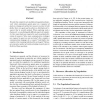Free Online Productivity Tools
i2Speak
i2Symbol
i2OCR
iTex2Img
iWeb2Print
iWeb2Shot
i2Type
iPdf2Split
iPdf2Merge
i2Bopomofo
i2Arabic
i2Style
i2Image
i2PDF
iLatex2Rtf
Sci2ools
112
click to vote
ATAL
2004
Springer
2004
Springer
On the Communication Complexity of Multilateral Trading
We study the complexity of a multilateral negotiation framework where autonomous agents agree on a sequence of deals to exchange sets of discrete resources in order to both further their own goals and to achieve a distribution of resources that is socially optimal. When analysing such a framework, we can distinguish different aspects of complexity: How many deals are required to reach an optimal allocation of resources? How many communicative exchanges are required to agree on one such deal? How complex a communication language do we require? And finally, how complex is the reasoning task faced by each agent? This paper presents a number of results pertaining, in particular, to the first of these questions.
Related Content
| Added | 30 Jun 2010 |
| Updated | 30 Jun 2010 |
| Type | Conference |
| Year | 2004 |
| Where | ATAL |
| Authors | Ulrich Endriss, Nicolas Maudet |
Comments (0)

